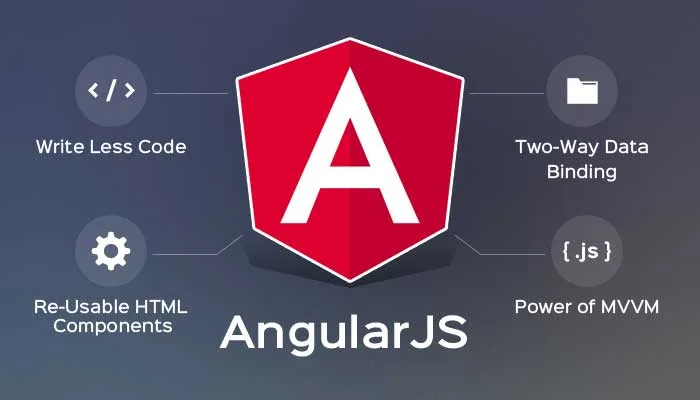The need for seamless software development has skyrocketed over time. We live in an age of digitization and organizations across the board are switching to automated platforms. With the help of skilled developers, businesses are building and deploying software platforms and applications based on their needs and preferences.
When it comes to developing single-page applications, some of the biggest companies across the globe hire AngularJS developers according to their specific requirements. If you are willing to start your career in this domain, it is important to be well-versed in what the framework is and how it works.
What Is AngularJS?
AngularJS is an open-source model-view-controller (MVC) development framework similar to the framework of JavaScript. It is one of the most popular frameworks today, making brands and organizations in all major industries willing to hire AngularJS developers for creating robust single-page applications.
The AngularJS framework is developed by a group of developers from Google, giving it the credibility of the tech giant. The extensive support from Google and ideas from a wide community forum makes the framework up to date at all times. It also incorporates the latest and most relevant development trends in the market to ensure scalable and seamless development.
The Architecture Of AngularJS
The framework of AngularJS incorporates the MVC (model-view-controller) architecture. The different components of the architecture are explained briefly as follows:
The Controller
This component of the AngularJS framework represents the layer containing business logic. Here, specific user events trigger functions stored inside the controller of the framework. The user events constitute a major portion of the controller.
Views
The views can be used by developers to represent the presentation layer provided to the end users.
Models
When it comes to the architecture of AngularJS, models are used to represent data pertaining to the organization. Here, the data can be as simple as having primitive declarations. For example, if an institute is maintaining data in the form of student applications, its data model can simply constitute the name and ID of a student. A data model can also be complicated by having a structured model in place. For example, if a user maintains a car ownership application, they can have structures in place for defining the vehicles in terms of their engine capacity, seating capacity, and other relevant factors.
Characteristics Of AngularJS
Here are some of the major characteristics of AngularJS:
MVC Architecture
AngularJS is designed based on the MVC architecture as discussed above. This design pattern is used in developing most web applications today. The MVC pattern splits the different layers of business logic, data, and presentation into different segments. This allows the developers to manage every section effectively, thereby streamlining the entire approach to development.
Lesser Code
In the case of carrying out the DOM manipulation, a large chunk of JavaScript needed to be written for designing an application. However, with AngularJS, developers can build and deploy responsive applications without having to write long and complicated lines of code. This makes the development process faster, simpler, and more effective.
Data Model Binding
Developers do not need to write special code for binding data to the HTML controls. AngularJS allows you to perform this task simply by adding a few snippets of code.
Unit Testing Ready
Along with developing a framework, the designers at Google also developed a dedicated testing framework called “Karma.” This framework helps developers in designing unit tests for applications built using the AngularJS framework.
What Is An AngularJS Module?
An AngularJS module is a module used by developers for defining the functionality of an application that is applied across an entire HTML page with the help of the ng-app directive. It clearly defines the app functionality such as services, filters, and directives in a way that makes it simpler for developers to reuse it in different applications.
Advantages Of AngularJs Development
Here are some of the major advantages of developing applications using AngularJS:
Open-source Framework
As the AngularJS framework is open-source in nature, it allows developers to build and deploy applications with lesser issues and errors. This increases accuracy and precision while working on app development projects.
Two-way Binding
The AngularJS frameworks allow developers to keep the data and presentation layers in sync. This relieves them from writing additional JavaScript code for keeping the data in their HTML code and later in sync. The framework will automate the process for the users, making development faster and more effective. All they need to do is specify the control that is bound and to which part of the model it is bound.
Managing Routing
AngularJS helps developers in seamless routing, making it easy for them to move from one view to another. This is the highlight in the case of developing single-page applications where developers can move to different functionalities in an application according to user interaction while staying on the same page.
Seamless Testing
AngularJS facilitates seamless testing to ensure that an application is developed according to the preferences and standards set by the clients. The framework supports both unit and integration testing to assess the effectiveness of the apps developed.
Extending HTML
The AngularJS framework extends HTML by providing developers with its own elements known as directives. At high levels, these directives act as markers on DOM elements like element names, comments on a CSS class, attributes, etc. that ask the HTML compiler to attach a specific behavior to a specific DOM element. The directives help developers in extending the functionality of the existing HTML elements, thereby giving more power to the web applications developed using AngularJS. This allows developers to create sing-page applications that are business-specific and serve all purposes of the concerned client.
The Final Word about AngularJS Development
These were some of the most basic aspects of AngularJS development you should know if you are willing to build a career in the domain. However, in order to secure a reputed job at a reputed organization, it is important to dive deeper and understand the nitty-gritty details of the development framework.





